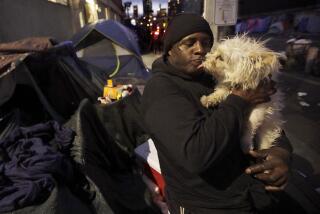Inability of Elderly to Afford Nursing Home Care Cited
- Share via
WASHINGTON — Nearly 70% of single elderly people would be impoverished after just 13 weeks in a nursing home, the House Aging Committee says in a report to be issued today. Financial disaster comes later for couples, who typically are reduced to poverty after one spouse has spent six months in a nursing home, the committee said.
“A host of personal catastrophes are in the making,” Rep. Edward R. Roybal (D-Los Angeles), the committee chairman, said in issuing the report, the first national and state analysis of impoverishment linked to long-term health care costs.
“This sorry state of affairs can be traced to the almost complete absence of long-term care insurance protection in America,” the report said.
The Aging Committee study, developed in cooperation with the Villers Foundation and the Urban Institute, was based on data from a major federal health survey in 1984, when the poverty level was $4,860 in annual income for a single person and $6,540 a year for a couple.
Few Qualify for Care
Medicare, the federal health program for those over 65 and for the disabled of all ages, pays for nursing home costs only in a handful of cases involving a temporary stay and a curable condition. The largest group of patients in nursing homes, those receiving custodial care because they are unable to live independently, receives no financial help from Medicare. And private insurance policies with nursing home coverage are relatively costly and have been purchased by only 400,000 people.
The Aging Committee study, based on federal figures, said Medicare pays for less than 2% of long-term care in nursing homes. Almost half the cost is paid by patients and their families. The rest is financed by Medicaid, a federal welfare program. The elderly “must essentially impoverish themselves, and probably their spouses, before they are protected by Medicaid,” the report said.
The study compared the income of persons over 65 with the expenses of nursing home care, which averages $22,000 a year, and private care at home, which costs $40 a day or more.
Risk of Impoverishment
The risk of impoverishment was calculated for the United States and for individual states. On a national basis, 69% of single people would find themselves in poverty within 13 weeks of entering a nursing home. The California figure for financial disaster was 71% of the elderly, slightly higher than the national figure, presumably reflecting the somewhat higher cost of nursing home service in the state.
Within a year in the nation, 94% would have their incomes reduced to poverty levels.
Couples--who generally have more income and assets than single people--can pay for a longer time before they go broke. After 13 weeks, about 34% of couples would have their income reduced to poverty levels. This rises to 78% of all couples by the end of a year.
“Not only are couples at great risk, but the at-home spouses, usually the wives, face their own health and long-term care needs with no financial assets and with only limited income,” the report said. “I would argue that the question is no longer ‘Should we provide health and long-term care protection, but rather, how should we provide such protection?’ ” Roybal said.
However, Congress has been reluctant to deal with the issue because of its huge potential costs.
A major expansion of Medicare, with separate House and Senate bills now awaiting compromise in conference, does not deal with nursing home care. Instead, it concentrates on bills for hospitals and for doctors’ services.
More to Read
Sign up for Essential California
The most important California stories and recommendations in your inbox every morning.
You may occasionally receive promotional content from the Los Angeles Times.












